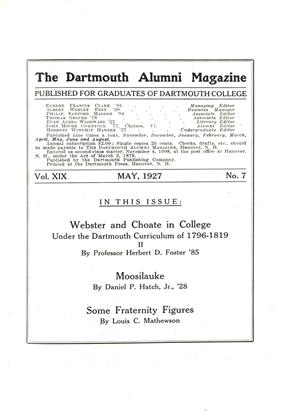One result of the installation of the new library when it becomes an accomplished fact, should be the stimulation of reading by the student body. When all is said and done a very great part of every man's education is acquired outside the class rooms and lecture courses, through personally conducted contacts with books. The books that men read because they want to read them do far more real good in the average case than the books one reads because one has to do it—because they are prescribed.
The essence of learning is interest in learning. Unfortunately few of us are really interested in more than one or two things, and the college curriculum affords abundant necessities for spade-work in fields where one has no special heart for the task. It must be done, however, and the successful teacher is the man who has the knack of awakening in his students sufficient interest to make them come to their work with genuinely receptive, rather than merely passive, minds. All that, however, is beside the present point. There is always the use to be made of the time which is at the student's free disposal, without direction, or very much direction, on the part of the faculty. If the new library can be made a sort of intellectual lodestone, drawing the many toward itself in their hours of freedom, a great thing will have been accomplished which never would have been possible so long as Wilson Hall afforded the sole instrument. To make good books easy to get at, in circumstances which do not repel men who would only too easily be deterred from seeking them, is the task which we hope and believe the Baker Library is certain to perform.
The recollection of Dartmouth as it was a generation ago with respect to this matter leads to general rejoicing that the old order is by way of changing. In the late '90's comparatively few men made use of the Library and reading was the recreation of comparatively few, because the facilities were so poor. The fact is that unless one reads rather omnivorously during the four years in college, one is unlikely ever to do the' sort of reading one should as a candidate for membership in the cult of liberally educated men. Not the least important of the collegiate functions is to induce a natural and spontaneous love of books, and to that end the new Library should be an incomparable incentive.
 View Full Issue
View Full Issue
More From This Issue
-
 Article
ArticleWEBSTER AND CHOATE IN COLLEGE
May 1927 By Herbert Darling Foster '85 -
 Article
ArticleTHE UNDERGRADUATE CHAIR
May 1927 -
 Article
ArticleMOOSILAUKE
May 1927 By Daniel P. Hatch, Jr. '28 -
 Article
ArticleSOME FRATERNITY FIGURES
May 1927 By Louis C. Mathewson -
 Article
ArticleDARTMOUTH STUDENTS SAID TO BE IRRELIGIOUS
May 1927 -
 Class Notes
Class NotesClass of 1921
May 1927 By Herrick Brown








